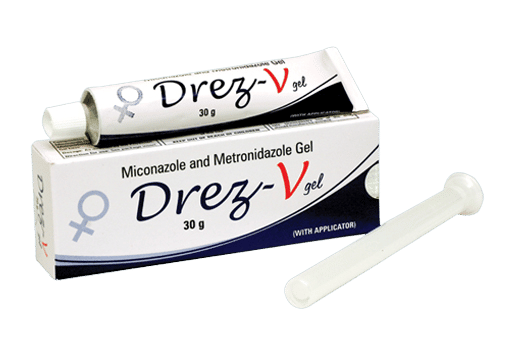Metronidazole+miconazole
About Metronidazole+miconazole
Metronidazole+miconazole is used to treat vaginal infections. Vaginal infection is the infection of the vagina and vulva (tissue at the opening of the vagina), which occurs due to the overgrowth of bacteria and fungi. Vaginal infection can cause inflammation, itchiness, thick discharge, change in colour of the discharge, burning sensation or pain during urination.
Metronidazole+miconazole is a combination of two drugs, namely: Metronidazole (antibiotic) and Miconazole (anti-fungal). Metronidazole kills bacteria by damaging their DNA. Miconazole works by preventing the formation of fungal protective covering, thereby stops the growth of fungi. Together, Metronidazole+miconazole helps in treating vaginal infections.
In some cases, you may experience common side-effects such as itching, irritation, headache, dizziness, and stomach upset. Most of these side effects do not require medical attention and will resolve gradually over time. However, you are advised to talk to your doctor if the side effects persist or worsen.
Let your doctor know if you are taking anti-fungal or antibiotic medicines. Consult your doctor if you are pregnant or breastfeeding. Do not use Metronidazole+miconazole in more than prescribed doses or for a longer duration unless prescribed by the doctor. Keep your doctor informed about your health condition and medicines you are taking to rule out any side effects.
Uses of Metronidazole+miconazole
Medicinal Benefits
Metronidazole+miconazole is a combination of two drugs, namely: Metronidazole and Miconazole. Metronidazole+miconazole is used to treat vaginal infections. Miconazole is an antifungal that works by preventing the formation of fungal protective covering, thereby stops their growth. Metronidazole is an antibiotic that kills bacteria by damaging their DNA. Together, Metronidazole+miconazole helps in treating vaginal infections.
Directions for Use
Storage
Side Effects of Metronidazole+miconazole
- Irritation
- Itching
- Headache
- Dizziness
- Stomach upset
- Loss of appetite
Drug Warnings
Do not use Metronidazole+miconazole if you are allergic to any of its contents. Inform your doctor if you have epilepsy, kidney/liver disease; if you are taking immunosuppressant drugs, corticosteroids, antibiotics or anti-fungal medicines. Consult your doctor if you are pregnant or breastfeeding. Avoid sexual intercourse during treatment with Metronidazole+miconazole. Metronidazole+miconazole may cause dizziness, so drive with caution. Avoid alcohol consumption during treatment with Metronidazole+miconazole as it might cause increased dizziness. Let your doctor know if you are taking prescription/non-prescription medicines or herbal supplements along with Metronidazole+miconazole.
Drug Interactions
Drug-Drug Interactions: No interactions found/established.
Drug-Food Interactions: No interactions found/established.
Drug-Disease Interactions: No interactions found/established.
Drug-Drug Interactions Checker List:
Safety Advice

Alcohol
cautionAvoid alcohol consumption whilst using Metronidazole+miconazole as it might cause increased dizziness.

Pregnancy
cautionPlease consult your doctor if you have any concerns regarding this; your doctor will prescribe only if the benefits outweigh the risks.

Breast Feeding
cautionPlease consult your doctor if you have any concerns regarding this; your doctor will decide whether Metronidazole+miconazole can be used by breastfeeding mothers or not.

Driving
cautionMetronidazole+miconazole may cause dizziness. Therefore, drive or operate machinery only if you are alert.

Liver
cautionPlease consult your doctor if you have any concerns regarding the usage of Metronidazole+miconazole in patients with liver impairment.

Kidney
cautionPlease consult your doctor if you are undergoing dialysis or have any concerns regarding the usage of Metronidazole+miconazole in patients with kidney impairment.

Children
unsafeMetronidazole+miconazole is not recommended for children below 12years.
Habit Forming
Diet & Lifestyle Advise
- Maintaining proper hygiene helps in preventing vaginal infection.
- Wear breathable fabrics such as cotton underwear. It helps in lowering the risk of vaginal infection and inflammation.
- Using a condom during a sexual intercourse helps in preventing sexually transmitted diseases.
- Do not scratch the affected area of the skin, as it can spread the infection to other body parts.
- Wash your bedsheets and towels regularly.
- Avoid getting in contact with harsh soaps, detergents and rough fabrics.
- Drink plenty of fluids. It helps in flushing out toxins from the body.
- Keep your vaginal area dry. After using the bathroom, clean and dry the area properly.
- Change sanitary pads and tampons regularly.
Special Advise
- Clean and dry the vaginal area before using Metronidazole+miconazole.
- If Metronidazole+miconazole comes in contact with eyes, nose or mouth, rinse with water immediately.
- Wash your hands before and after using Metronidazole+miconazole.
- Talk to your doctor if you develop thrush (vaginal itching and redness) whilst using Metronidazole+miconazole.
Patients Concern
Disease/Condition Glossary
Vaginal infection: Vaginal infection is the infection of the vagina and vulva (tissue at the opening of the vagina). It can occur due to the overgrowth of bacteria, fungi or yeast, vaginal atrophy (a condition commonly occurring after menopause), sexual intercourse, irritants such as harsh soaps, perfumes, body washes, vaginal contraceptives or tight-fitting clothes. Vaginal infection can cause inflammation, itchiness, thick discharge, change in colour of the discharge, burning sensation or pain during urination, vaginal bleeding or spotting, and pain during intercourse.
FAQs
Metronidazole+miconazole contains Metronidazole and Miconazole. Metronidazole kills bacteria by damaging their DNA. Miconazole works by preventing the formation of fungal protective covering, thereby stops the growth of fungi. Together, Metronidazole+miconazole helps in treating vaginal infections.
Discontinuing Metronidazole+miconazole may cause the reappearance of vaginitis symptoms and recurrence of vaginitis. Continue using Metronidazole+miconazole for as long as your doctor has prescribed it to you to treat your condition effectually. Do not be reluctant to speak with your doctor if you experience any difficulty while taking Metronidazole+miconazole.
Metronidazole+miconazole might damage condoms and diaphragms, making them ineffective in preventing pregnancy. Consult a doctor if you have any concerns regarding this; your doctor may advise regarding other methods of contraception.
Avoid using other vaginal products such as tampons, spermicides, and douches during treatment with Metronidazole+miconazole.
Consult your doctor regarding the usage of Metronidazole+miconazole during the monthly period. Your doctor may advise you to stop using Metronidazole+miconazole during your period or to use unscented sanitary pads.
Talk to your doctor if your condition does not improve despite using Metronidazole+miconazole for 3 days or if it lasts for more than 7 days. Consult your doctor if the infection recurs within 2months. The doctor may prescribe an alternate medication.




